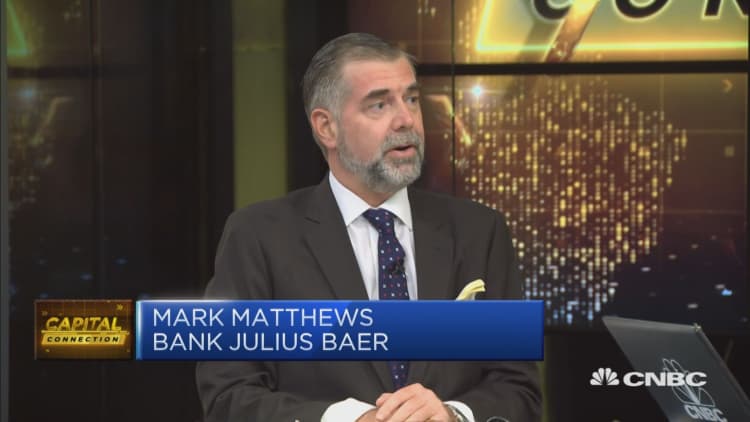Hong Kong's battered stocks may be on the cusp of a historic buying opportunity, with eleven straight weeks of protest and a protracted trade war pushing equity valuations to "compelling" lows.
"The opportunity has arisen by the large decline in share prices there," Mark Matthews, managing director and head of research at Julius Baer, told CNBC's "Capital Connection."
"We looked back to 1973 — we found that only 10% of the time has the Hang Seng index traded below 10 times," Matthews said, referring to Hong Kong's average price-to-earnings ratio of around 10.46 times — its lowest in several years. The price-to-earnings ratio is an important metric used by traders to gauge the value of a stock or an index.
"You could argue the composites of it have changed a lot since 1973, but actually, I would say, that makes the case more compelling."
The Hang Seng index (HSI), the most widely-quoted gauge of local stocks, is struggling through its worst quarter since 2015. The index fell to a seven-month low last week and has erased its gains for the year.
The Hong Kong market also slid in July, with sentiment weakening amid concerns over a global economic slowdown. The pullback has become particularly apparent in Hong Kong's heavyweight property sector, where HSI-listed stocks fell 5.2% last month.
It's also evident in the financial sector, which fell more than 4% in July.

"Hong Kong banks have the most direct exposure to a Chinese slowdown," ratings agency Fitch said in a recent research report.
"We cut our assessment of the operating environment for Hong Kong's banks to 'a' stable from 'a+' negative in 2018 due to the growing links between the territory and mainland China," the firm added.
A weak yuan also poses concern for listed companies that source revenue from mainland China, leading some analysts to cut earnings and profit forecasts for some Hong Kong firms.
"I'm not saying the bottom is today or tomorrow or the next month, but if you look back in history, when the index was this cheap were definitely times to buy it," Matthews added.
The index has slumped 13% from its most recent intraday high of 30,280 reached in early April. The index is also a far cry from an all time intraday high of 33,484 reached in January 2018.
The ongoing demonstrations in Hong Kong — a former British colony that was returned to Chinese rule in 1997 — started as peaceful rallies against a single proposed law. They've since snowballed into a wider pro-democracy movement, with some even demanding full autonomy from Beijing and occasional outbreaks of violence and disruptions to the city's operations.
—CNBC's Grace Shao contributed to this article.


